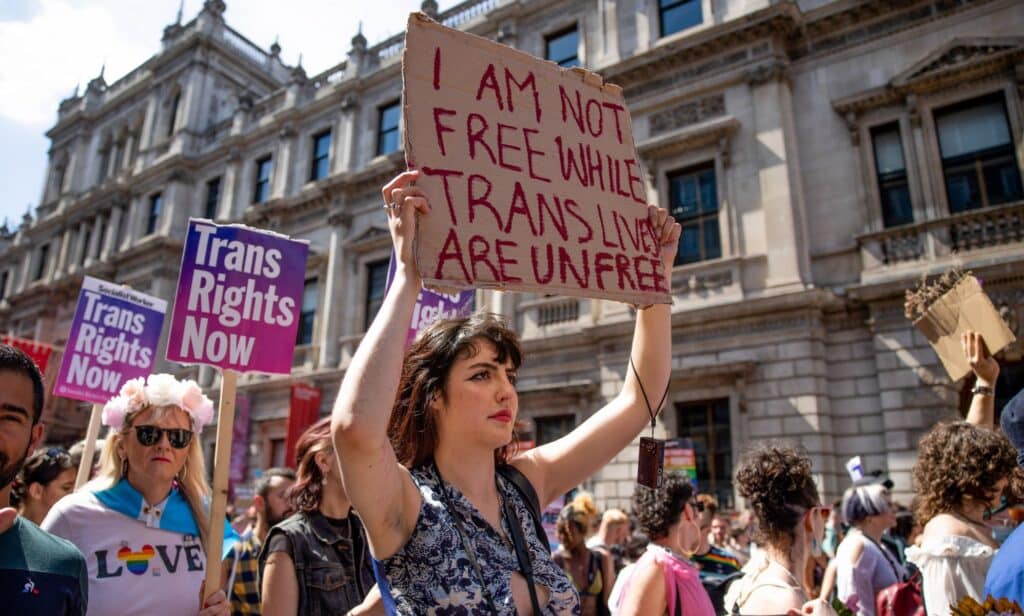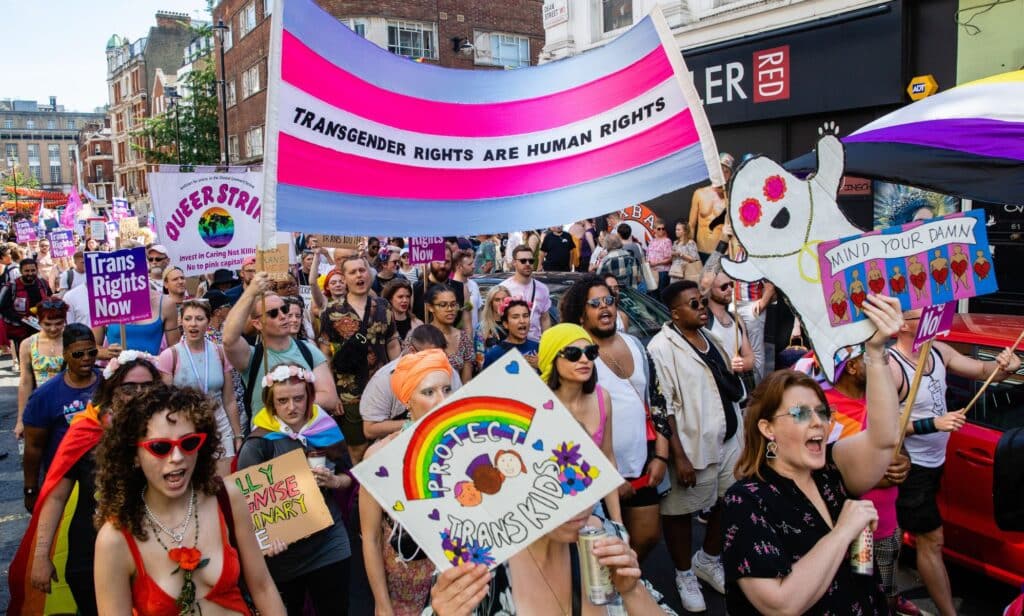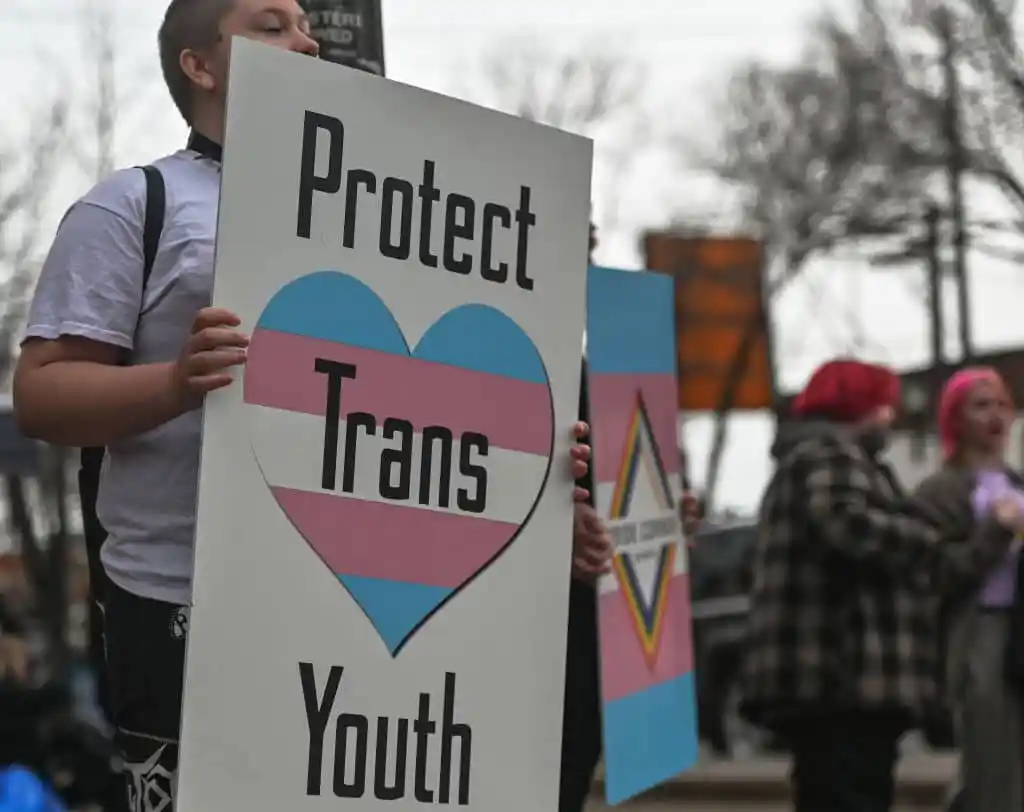Trans youth are being hit hard by the cost of living crisis. (Getty)
The cost of living crisis is forcing queer young people out of safe homes and into potentially dangerous situations.
The economic crisis is hitting young people in the UK especially hard as landlords demand higher rents and inflation hits more aspects of everyday life.
British households are also facing a looming steep rise in energy bills from October after regulator Ofgem raised the energy price cap by 80 per cent on Friday (26 August).
Melissa Gilpin, marketing and communications manager at LGBTQ+ youth homelessness charity akt, told PinkNews the looming crisis is “undoing years of work” in helping young people at risk of homelessness – especially trans youth.
The cost of living crisis is “pushing” many queer youth “out of safe spaces” because they “can’t afford rent in private housing”.
“If you’re under 35, the government can give you £300 a month in Manchester towards rent, and you’re supposed to be in shared housing,” Gilpin said. “But at the moment, rent can be up to £600 to £1,000. Where are you getting the rest of the money – especially if you factor in that unemployment is a massive issue?”
Gilpin said akt has seen young people being “pushed further away from their support networks and communities” as a result of the cost of living crisis and lack of trans-friendly housing. While many couch surf, there is a concern that some queer youth could be forced to return to unwelcoming family homes.
“A lot of parents [of these young people] say: ‘You can move back home, but you’re not allowed to out as trans or as queer,’” Gilpin said.
“Trans youth get rejected from a lot of housing, like for instance single-sex or women’s-only hostels,” Gilpin added. “They then don’t accept trans women, which is an issue anyway.”

Guidance from the Equality and Human Rights Commission (EHRC) issued in April said separate and single-sex service providers should balance the “rights and needs of trans people alongside the rights and needs of other service users”.
It went on to say that such spaces – which include single-sex or separate toilets, refuges, changing rooms or hospital wards – can “prevent, limit or modify trans people’s access to the service” if it achieves a “legitimate aim”.
However, several LGBTQ+ groups have denounced the EHRC’s guidance, saying it “contradicts the true means of ‘equality’”.
Gilpin said trans youth are being rejected a “lot more often” since the guidance was issued and that there is a lack of hostels that are trans-friendly to begin with.
Many young trans people are forced to “choose between eating and getting gender-affirming care” due to lack of funding.

Increasingly, trans people are accessing such healthcare privately and crowdfunding for affirming treatments due to the years-long waitlists through the NHS.
“For trans youth, getting gender-affirming services and care is a huge priority for how they spend their money,” Gilpin said. “At the moment, they’re not able to afford hormones so a lot of people are choosing between eating and getting hormones.”
She added: “We’re seeing this at the moment where people are having to come off their hormones because they need to pay their bills, and this triggers huge gender dysphoria and mental health issues.
“They have no way to budget for the future. This is undoing a lot of their gender-affirming care they’ve been putting their money into which became a cycle of maybe substance abuse, having breakdowns, getting back onto the street and getting into sex work to be able to afford hormones again.”
Gilpin said the charity is only able to do “contingency planning” at the moment. As such, akt is seeking help from the public to support LGBTQ+ youth impacted by the lack of government support and the cost of living crisis.
“The barriers to accessing safe, affordable housing for queer trans youth are exasperated a lot more by the cost of living crisis, but the barriers existed before that and affect trans people a lot more because it’s harder for them to find jobs, get into any space or housing,” Gilpin said.
Gilpin added it was “nearly impossible” at the moment for trans youth who are “rejected by their family to get into long-term safe, private housing” given these barriers.
She said it was essential for the Tory government to commit to a strategy to end homelessness and include a “specific call out to queer youth” within it.
“They can’t just be lumped in with the homelessness population because they have specific needs to access housing and employment services,” she said.
